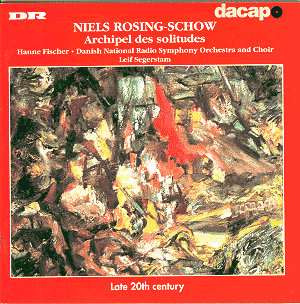Niels ROSING-SCHOW
(b.1954)
Archipel des solitudes for mezzo soprano, choir and
orchestra*
Windshapes (1992) for winds, harp, piano and percussion+
 Hanne Fischer
(mezzo-soprano)
Hanne Fischer
(mezzo-soprano)
Danish National Radio SO/Leif Segerstam
* recorded Copenhagen Dec 1995 + recorded Copenhagen Sept 1999
 DA CAPO 8.224163
[53.19]
DA CAPO 8.224163
[53.19]
Crotchet
AmazonUK AmazonUS

Rosing-Schow's music is uncompromising, dark, challenging and often hard
on the ears! In this respect, it has a lot in common with many, many other
composers who have emerged in the past ten years. This is apparent within
the first seconds of Archipel des solitudes, the composer's seven
movement setting of texts by the French poet Gilles Gourdon. The mezzo soloist
struggles to make herself heard against torrents of sound from screaming
wind and brass, and, naturally, a vast array of percussion, pitched and
unpitched. (It would be so impressive to find a young(ish) composer prepared
to compose an orchestral work with a tiny percussion section, or none at
all.)
Though the stressful, catastrophic atmosphere persists throughout the piece,
the composer's personal voice does gradually emerge. He has an undoubted
ear for orchestral texture, and there are passages of real beauty. Yet still
the voice part seems 'tacked on', almost an afterthought. The most successful
movements, I felt, were the two which were entirely orchestral, raising the
question of whether Gourdon's intimate verse was really suitable for treatment
on this huge scale.
The purely instrumental work which fills the disc - Windshapes for
wind, harp, piano and percussion - seemed to me an altogether more successful
and satisfying piece. The first movement, Windswept Landscape, contrasts
slow moving music in brass with delicate staccato in woodwind, while the
second, Sand Drift, develops a colossal energy and momentum. This
is interesting, impressive music, with compelling visual suggestiveness,
as you find in, for example, Debussy.
Rosing-Schow's music is new to me, so I have to say that, despite my reservations
about Archipel, overall I was excited by this disc. The performers
do a great job; Fischer is a splendidly secure and committed vocal soloist,
and Segerstram and the Danish NRSO play superbly throughout. Recording quality
is excellent.
Gwyn Parry-Jones
Niels Rosing-Schow (born 1954) is one of Denmark's leading contemporary
composers.
I look forward (but without much hope) to the day when programme notes
accompanying contemporary music are written in plain English. Or could it
be that in the nature of things this is impossible? The composer's career,
we are told here, 'took its point of departure in the "New Simplicity" of
the 1970s' (or the 1960s, as later asserted), and he 'seeks to explore different
ways in which music that acknowledges the tenets of modernism can still reconquer
the great musical spaces without resorting to the ready-made options that
are available to adherents of the main compositional currents.' Does this
opaque statement mean simply that the composer seeks to express himself in
an individual voice?
Still, one readily acknowledges that Rosing-Schow does possess an
individual voice, and the sleeve note is right to draw attention to his
'fascinating timbres and seductive instrumental colouring.' This is avant-garde
music, certainly, but its sound-world is not totally alien to that of mainstream
tonal music.
This is better revealed in Windshapes (1992) - three 'orchestral pictures'
entitled Windswept Landscape, Sand Drift and Erosion,
scored for woodwind, harp, piano and percussion. In essence, the work has
something in common with Debussy's La Mer: impressionistic rather
than pictorial, it shares also the clarity of texture which is the hallmark
of that composer's seminal work.
Clarity of texture and distinctive orchestral timbres also characterise
Archipel des solitudes (1992). Alas, this is a setting for mezzo-soprano,
chorus and orchestra of yet more 'what is the meaning of life?' poems (by
the Frenchman, Gilles Gourdon), to which contemporary composers are irresistibly
drawn. Here is an extract from the text: 'Tired ice-fern,/Sudden fracture.
Hair knot of torrents/ Loosened. Pulse of the pebbles precipitous,/The jars
of the night revealed.' Would not the following alternative text with words
chosen at random have served equally well: 'Blunt hacksaw/Blood spewed. Prunes
at work/Later. Celebrity junked/ Get a good plumber'?
Performance and recording faultless but this is perhaps a disc only for devotees
of 'The New Simplicity'.
Adrian Smith

